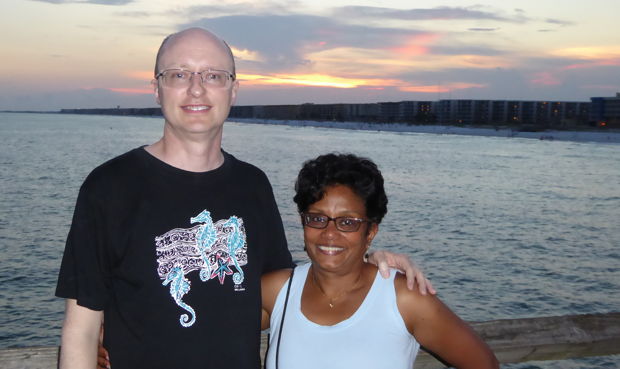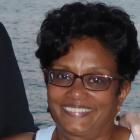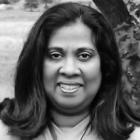Tell me a little bit about yourself. Where did you grow up and how did you develop both a deep love of God and a deep love of science?
I grew up in Sri Lanka, in a nominally Christian household being taken to church as a child, and then getting “confirmed” as a member of a church at age 15. I learnt many biblical passages and knew all the biblical stories but didn’t have a personal relationship with God. In university, in Colombo, Sri Lanka, I started attending an IFES-affiliated group where I started to realize what being a Christian really meant. I read books by C. S. Lewis, John Stott, Bruce Milne and began to grow in faith. Living alone at the time because my family had emigrated to the USA, I came to depend on God, knowing Jesus as my friend and savior.
I wouldn’t say I have a deep love for science. I appreciate the scientific methodology which was quite imbued in the family, considering my mother has a BS degree and taught high-school biology and my father has a BEng degree and worked in factories producing cement and chemicals. My mother had me dissecting a bird when I was nine. My father wanted me to understand the curvature of a dam when I was eleven. I grew up knowing there is a reason for everything and always asking why.
You have worked in several roles in the Department of Defense. Could you give us a picture of what your work was like in the different branches of the military that you served in? What did (or do) you enjoy doing?
I was surprised to be offered a permanent civilian position at the Naval Research Lab (NRL) almost straight out of grad school. (Even though I was an immigrant, during the years it took to complete my BS and PhD, I had gotten US citizenship.) I started at NRL doing basic research that, if successful, could have had huge impact on military weapons but was so high risk that the same line of research has not yet (twenty years later) yielded such success! From NRL I moved to Naval Surface Warfare Center at Indian Head, Maryland, where I did some basic research but also some applied research that would transition to evolutionary advances in our weapons.
Next, I worked at the Defense Threat Reduction Agency (DTRA) as a program manager of a basic research program, funding universities to do research to combat weapons of mass destruction. The best aspect of that job was meeting and learning from a wide variety of academics. I was glad to use the program to support new professors just starting out in their careers and graduate students trying to finish their theses and get jobs.
Now I am back in the lab, this time at Air Force Research Lab (AFRL) as a senior scientist, which is a level above the usual GS salary series. Here I am more of a thought leader, planning research to improve future munitions and working with teams of great young engineers to implement research plans, perform tests, and do modeling and simulations.
Help us understand what vocation and stewardship means in your line of work.
Vocation and stewardship for me, as a government employee, means doing my best to optimally use the tax-payer dollars that fund us. We don’t just do research that interests us, nor do we do that research without considering the risk, the gains from the outcome of the research, what others have already accomplished, etc. It takes a lot of time and a lot of effort to thoroughly research who has done what in a certain research area, to seek out and talk to other “giants” in that research area. But without that effort we may waste tax dollars by trying to reinvent the wheel (re-doing work that others have already done) or competing with others (doing the same research as them) that are also funded by tax dollars. As Sir Isaac Newton wrote, we can only see farther by standing on the shoulders of giants, and for me, tax payer dollars are more optimally used if we collaborate with such giants rather than compete. It’s more cost effective to push the state-of-the-art together in collaborating teams rather than as individuals competing (spending double or triple) and running each other down.
Do you have a story of how God has used you for human flourishing within the military establishment?
The military establishment is very regulated, with lots of steps and protocols we have to follow. We have a lot of training, the same repeated training year after year. Sometimes, we have a safety officer coming up with some impossible-to-achieve safety standard, requiring days and weeks of discussions and negotiations, just to get one experiment done. Many co-workers are frustrated or discouraged by these conditions. Some may give up trying to do such an experiment, etc. I persevere with patience, because I know that “all things work together for good to them that love God, to them who are the called according to his purpose.” (Romans 8:28)
One year, the lab I was at was very much part of the BRAC (Base Realignment and Closure) process. We were afraid we’d be shut down and told to move across the country. Many co-workers were discouraged. I would get us together and encourage us to come up with ideas of what we could all do if the base was BRACed. I believe that God would only want what is best for us, and discerning “His will, His good, pleasing and perfect will” helps us understand our life situations. (Romans 12:2b)
You told me that you view problems as learning opportunities because nothing is impossible with God. Do you think your attitude is partially influenced by growing up in a country with fewer resources compared to the resources available in the United States?
Probably. We who are from less-well-to-do countries may have a resilience that those who grow up in comfort may lack. We are used to applying biblical verses to our lives because of the poverty we see and the fears we have because of the political situation of that country. A broken leg or a traffic jam is trivial compared to going hungry every day or getting blown up by a terrorist bomb. When I was eighteen, about four months from graduating high school in Sri Lanka, there was a small Tamil Tiger (terrorist) attack on an Army contingent that caused major country-wide retaliation against the Tamil people, leading to an out-an-out terrorist war in Sri Lanka. I lived through years of curfews, closed schools, bombs going off, etc. I think of all of them as learning opportunities. Many US co-workers complain about lack of funds, lack of resources, etc. and I think we just need to persevere through these, because getting through a challenge only increases our learning. Nothing is impossible with God (Luke 1: 37), and so if he is putting me through a particularly bad situation or a challenge, I believe it is so that I can learn from that and grow into his image, and so that he is glorified.
It might interest our readers that you hold a civilian position in the Air Force equivalent to a Brigadier General. Are there many first-generation immigrants in comparable positions?
Actually, there are quite a few of us in the sciences. Some of the more famous ones have led the National Science Foundation, and other such agencies. Within AFRL, quite a few of the Senior Scientists (in positions equal to, or higher than mine) were not born in USA. However, there are very few women in such positions. Interestingly, all three of the women scientists (with PhDs) in AFRL who are in similar (or higher) positions, are immigrants!
What is your experience of being a woman leader in a predominantly male domain?
It is not easy for women to infiltrate groups and teams with a lot of males, especially when the guys are introverted engineers who are used to working on their own. Being a very petite woman makes it more difficult, because conversations are often going on above your head, literally! What has helped my career is that I am confident and outgoing. When I am at a conference or large meeting with lots of tall men, I will still walk up to a group, introduce myself, and start conversations. I readily admit that there are physical things that I am not built to do. Starting with such admittances can help women get on with co-workers in the lab. Some might consider me an aggressive person because I speak out, never yelling or angry, but just telling it like it is. This honest talk-style affects guys with delicate egos and may in some instances hinder me from achieving my end. Knowing when to speak out, knowing the correct words to use that are best heard by many, and knowing when to stop speaking (so you aren’t considered a nag) are all constantly in my thoughts during all my interactions in the work place and cause me the most stress at work.
Working in government with many scientists who don’t believe in God, how are you (and others who believe in the historic Christian faith) impacted by the constitutional separation of state and church?
It is interesting. For the 18 years that I was in Navy labs and DTRA, which are all in the Washington DC area, it was obvious that we were never to talk about religion. If I even mentioned going to church on Sunday in a casual conversation at work, I would get stared at. I felt like I would be mocked for believing in an invisible being. But now, working in Eglin Air Force Base in Florida, it is very different. Co-workers talk about what church they go to, who else from work goes to that church, etc. We have work prayer groups for praying for sick co-workers, etc.
I think this difference from the DC-area to the south is also seen in recent election results, and other continuing incidents. For instance, the occasion when Bernie Sanders interviewed the nominee for the post of Deputy Director of the OMB was disturbing for many Christians. The underlying assumption seemed to be that Christians can’t be neutral but the secular person is. I pray that the best intentions within the US constitutions are upheld, that there be “no law prohibiting the free exercise of religion” so we can be Christians even at our government jobs, and that no national religion be established, providing religious freedom for all in the USA.
Thank you, Suhithi
"The views expressed are those of the author and do not necessarily reflect the official policy or position of the Air Force, the Department of Defense, or the U.S. Government."





